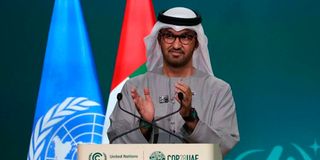Climate summit shifted world view on fossil fuel

COP28 president Sultan Ahmed Al Jaber applauds his during a plenary session at the United Nations climate summit in Dubai on December 13, 2023. Nations adopted the first-ever UN climate deal that calls for the world to transition away from fossil fuels.
Although it might be hard to see just yet, the world shifted last week, thanks to the outcome of the COP28 climate summit in Dubai, United Arab Emirates.
For the first time in history, every country in the world formally recognised that fossil fuels were the cause of the climate crisis and committed to transition away from them – with action to be taken this decade.
It is quite remarkable in itself that it took until the 28th COP meeting for countries to finally even include the words ‘fossil fuels’ in an outcome agreement.
As Patrick Galey, an investigative journalist with Global Witness pointed out, it’s like a malaria conference taking 30 years to reference the word ‘mosquito’. But the good news is that we’ve now named the elephant in the room. The genie will never be going back in the bottle and future COP meetings will only tighten the screw further on dirty energy.
For Africans, who have the most to lose from ever growing emissions and rising world temperatures, there is now light at the end of the tunnel that the world is finally naming the problem and will start to phase out fossil fuels.
Kenya is already a leader when it comes to realising the benefits of clean energy. Our electricity mix is already more than 90 per cent renewable and President William Ruto has pledged for it to be 100 per cent by 2030. We need more countries to be following this example and hopefully now they will.
The other concrete outcome for Africa was the establishment of the Loss and Damage Fund. This fund is designed to compensate people living on the front line of the climate crisis who have lost their livelihoods and homes to devastating droughts, floods and storms. First agreed on African soil last year at COP27 in Egypt – in the face of opposition from some rich countries – the fund was formally operationalised on the first day of COP28.
However, it wasn’t all good news coming out of the summit in Dubai. The main thing lacking is finance for countries in the global south, both to fund this needed energy transition and also help people adapt to a changing and distorted climate.
This is where we need African leaders to be stronger and stand up to the global north and demand they pay their climate debt. The global transition away from dirty energy needs to be funded if it is to go as quickly and smoothly as possible. There are countries in the global south ready to begin the switch but they require financial support to make it happen.
There also needs to be much more focus given to the finance around adaptation. Getting off fossils fuels is one half of the climate coin, addressing the impacts people are already facing is the other. Too often this element is not given sufficient attention and as a result, adaptation funding is miles below where it needs to be. In the Dubai Consensus, the name of the agreement struck at COP28, countries recommitted to doubling the current levels of adaptation finance. However, this is not enough. The UN’s Environment Programme, headquartered in Nairobi, published its Adaption Gap report last month which showed that even if the current levels of adaptation finance are doubled – the actual adaption needs of vulnerable people is 5 to 10 times higher than this.
The good news is that next year’s meeting, COP29 to be held in Baku, Azerbaijan, will focus on mobilising the finance that is needed to tackle climate change. African leaders have 12 months to get their act together, pool their resources and come up with a strategy for ensuring we get the most ambitious outcome possible, one that really meets the needs of African communities.
COP28 was a major step forward. It will be looked back on as a significant moment in the history of humanity’s attempt to shift our trajectory from one heading for climate breakdown, to one powered by clean, renewable energy that ensures a prosperous and safe future for all. The next step is to ensure we can unlock the finance to ensure it happens as quickly as possible.
- Mohamed Adow is Director of Power Shift Africa





